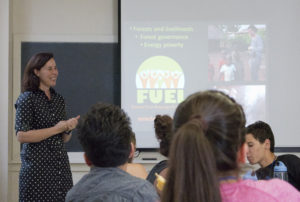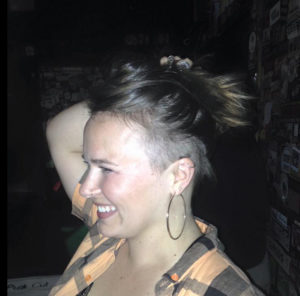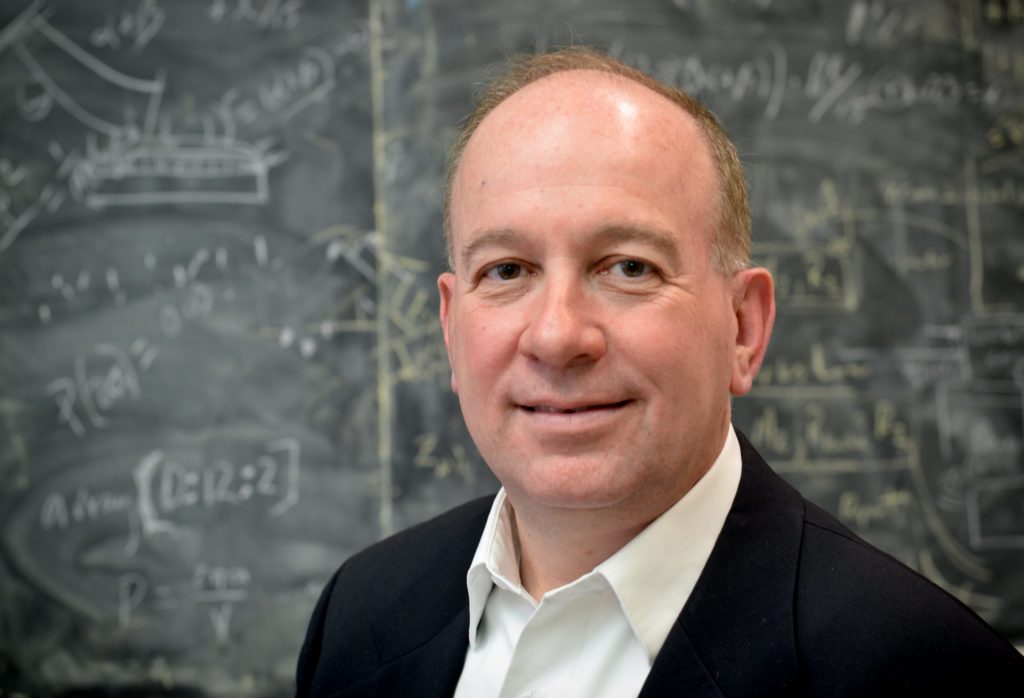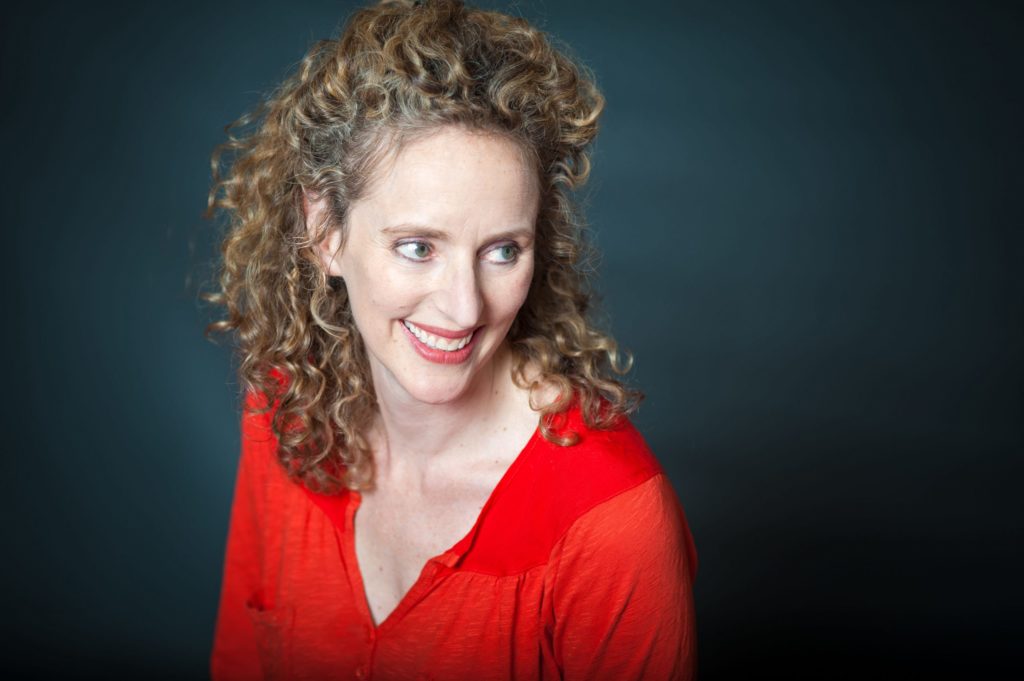
Faculty, staff and graduate students in UNC’s College of Arts and Sciences have had a full and fruitful summer in Chapel Hill — engaging students in research about topics from climate change to archaeology, helping teachers enhance their curricular content on the African diaspora, creating beautiful music and lively theater performances for community audiences and more. As we gear up for a new academic year, we share a snapshot of their activities.
Rocking the stage with Guys & Dolls
Dramatic art faculty and PlayMakers Repertory Company professional staff guided an uber-talented cast and crew of high school-age actors and backstage technicians in mounting the Summer Youth Conservatory’s hit production of Guys & Dolls.
The musical had the Paul Green Theatre jumping July 15-25 as the culmination of PlayMakers’ award-winning six-week educational/performance program for young people. This year, students from 18 Triangle-area schools worked with theater professionals including adjunct assistant professor Jade Bettin (costume design) and PlayMakers staff Dominic Abbenante (lighting design) and Laura Pates (technical director), among others. Associate artistic director Jeff Meanza was the director.
Recognized as “a model program for youth theatre in North Carolina” by the North Carolina Theatre Conference, SYC features Theatre Intensive and TheatreTech for high school students and Theatre Quest for middle-schoolers.
PlayMakers education manager Jenny Wales, who has coordinated the conservatory for the past four years, said, “This is my favorite thing we do here at PlayMakers. If you haven’t been to an SYC show, check it out — it’ll knock your socks off.”

Making climate change connections
Exposure to cookstove smoke from burning fuels such as wood and charcoal is the largest risk factor for disease and death in Rwanda.
Pam Jagger, associate professor of public policy and environment and ecology, discussed her research on the health and environmental dangers of cookstove smoke in sub-Saharan Africa during an August workshop for high school students in the Climate Leadership and Energy Awareness Program (LEAP).
Since 2009, Climate LEAP has connected students from Durham and Orange counties with scientists and educators to examine how climate and energy interconnect.
One of the students asked Jagger how she reconciles her research findings with a country’s local traditions.
“As a researcher, my job is not to tell people what to do, it’s to help them think about strategies for change and then to study if those are working,” she said. “For instance, we have provided information to the government of Malawi and explained the problem. It’s really important that the ownership of large-scale changes come from within.” Read more about Jagger’s research and the work of her FUEL lab.

Creating beautiful music
Sweet music filled concert halls all over campus this summer as musicians came to town for the 24th annual Chapel Hill Chamber Music Workshop.
Participants came from across the United States and England, Belgium, Holland, Israel and Japan.
“We are about 75 in number with 16 faculty members and a staff of five,” said Donald Oehler, professor of music and founder and artistic director of the workshop. “UNC undergraduates also participate as performing assistants.”
The workshop is for pianists, string players, woodwinds and French horn. This year, organizers established a small chamber choir under the direction of Susan Klebanow.
An emerging young artist group also participates each year through the Clark Wang Workshop Enrichment Fund. This summer the Larchmere String Quartet presented a concert, and the group performed with and coached participants throughout the week.
“It was a grand week for chamber music, and we look forward to presenting and celebrating the 25th edition in the first week of June 2016,” Oehler said.

Encouraging the next generation of young scholars
Anna Agbe-Davies, associate professor of anthropology, and Ariana Vigil, assistant professor of women’s and gender studies, helped to support the next generation of outstanding scholars by serving as mentors for the Moore Undergraduate Research Apprentice Program (MURAP).
MURAP is a graduate-level research experience for highly talented undergraduate students from diverse backgrounds who are interested in pursuing doctorates in the humanities, social sciences or fine arts.
Agbe-Davies mentored two rising seniors.
“We participated in seminars, met regarding their research projects and got to know faculty from across the University, as well as students from across the country during an intense and rewarding 10 weeks,” she said. “This summer has made me see my own research in a new light and been a wonderful opportunity to glimpse the future of the academy. “
Vigil also worked with two rising seniors. They came from different disciplines but their projects aligned with her research areas of Latina/o studies, militarization, and gender and sexuality studies.
“As a faculty member who participated in a similar program as an undergraduate student, I can personally attest to the importance of opportunities such as MURAP,” Vigil said. “MURAP provides students with experiences that will allow them to succeed in graduate school and fosters strong relationships with students and faculty that will support them as they pursue their academic and career goals.”

Instilling in young campers a love of science
Can you dig it?
Kindergarteners and first-graders did just that as they participated in an archaeology-themed summer science camp offered by the Morehead Planetarium and Science Center.
Marissa Wojcinski, a Ph.D. student in anthropology and a teaching assistant in archaeology, gave tours of the archaeology lab to the campers, who also met students cleaning artifacts from the Wall site dig in Hillsborough.
“We talked about how archaeologists are like detectives as they search through the puzzles of the past. We finished up the visit with campers becoming archaeologists themselves: by excavating artifacts (chocolate chips) from an archaeological site (cookie),” Wojcinski said. “Campers were able to see for themselves how archaeology is both destructive and scientific— although in real life we don’t get to eat our artifacts.”

Offering hands-on neuroscience activities to new audiences
Neural Connections is a new outreach group focused on delivering hands-on neuroscience activities to the community. Marsha Penner, lecturer and director for undergraduate research in the department of psychology and neuroscience, said the group kicked off unofficially last spring.
“At the ‘Science of Sour’ event hosted by the N.C. Museum of Life and Science, we used hands-on activities to demonstrate the neuroscience of taste perception,” Penner said. “Over the summer, we have also been busy planning additional outreach activities that we will deliver in the fall through partnerships with the Morehead Planetarium and Science Center, and with the UNC First Look,” a program designed to give middle school students an introduction to college.

Exposing middle and high school teachers to the African diaspora
Middle and high school teachers were give tools to help them explain the African diaspora in their secondary social studies and world language classrooms through the African Diaspora Fellows Program (ADFP).
Kia Caldwell, associate professor of African, African American and diaspora studies and the new director of faculty diversity initiatives in the College, and Emily Chávez, outreach coordinator for the UNC-Duke Consortium in Latin American and Caribbean Studies, serve as program co-directors.
The ADFP was developed and implemented with the partnership of UNC’s Africa Studies Center and the Institute for the Study of the Americas, the N.C. Department of Public Instruction and the Durham Public Schools. Additional support was provided by UNC’s Center for the Study of the American South.
One teacher said of the two-day workshop, “As a world history educator, the idea [of the] diaspora comes up several times during the course of the year. Now I can explain the concept in a clear and meaningful manner.”
Other UNC faculty presenters included Lisa Lindsay (history), Joseph Jordan (Stone Center, AAAD), William Darity (emeritus, economics) and Renee Alexander Craft (communication). Barbara Anderson from the African Studies Center was also involved in the program.

Teaching, creating and serving
Black “party” records — those risqué, mid-20th century albums in brown paper packages that record store clerks hid behind the counter and black Americans listened to behind closed doors — have mostly vanished from memory.
But vinyl technology was resurrected for a Maymester 2015 course. Students in “The Ethics of Stand-Up Comedy” taught by Michelle Robinson, assistant professor of American studies, sampled firsthand the “record party” as a historical phenomenon and a form of American sociability.
Students attended their own record party hosted by graduate research consultant and resident music expert Mathew Swiatlowki (American studies) and comedy buff Philip Macdonald (folklore) in Greenlaw Hall’s Donovan Lounge, complete with a bona fide record player and second-hand albums.
“After researching comedy albums as material culture and historically situated expressions of American humor, the students began to eavesdrop on its original audiences, and to imagine the ways that stand-up comedy constructs, disrupts and records American identities,” Robinson said.
***

María DeGuzmán, professor of English and comparative literature and director of Latina/o studies, spent a portion of her summer in Chapel Hill creating photographic miniature scenes done with tiny household items, glass prisms, bits of reflective paper and toy figurines. Greensboro-based Elsewhere Museum’s magazine I Don’t Do Boxes will publish some of her work, including “Caught in a Shower of Light” (pictured at left).
In addition to working on scholarly publications (among them an article on Latina/o writers in the South for the forthcoming volume of essays The Oxford Handbook of the Literature of the U.S. South), DeGuzmán composed and recorded seven new pieces of music, which she shared with the greater community via her Soundcloud website.
***

In her first year on the Orange County Rape Crisis Center (ORCC) Board of Directors, Jaclyn Gilstrap, program officer with the UNC Center for Global Initiatives, has helped the center raise over $100,000. This summer, she convinced friends and family to donate money in exchange for her shaving a portion of her head in the OCRCC’s “Punk Cuts to End Rape” event, which raised more than $7,500.
Compiled and edited by Kim Spurr, UNC College of Arts and Sciences



